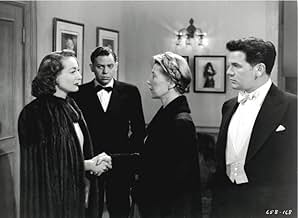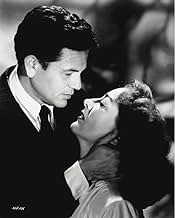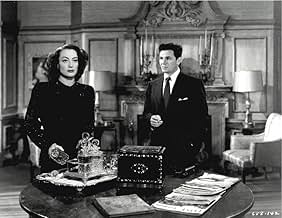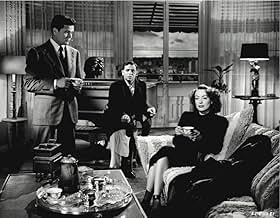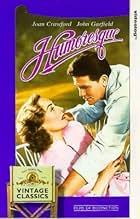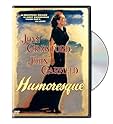VALUTAZIONE IMDb
7,3/10
5173
LA TUA VALUTAZIONE
Aggiungi una trama nella tua linguaA classical musician from the slums is sidetracked by his love for a wealthy, neurotic socialite.A classical musician from the slums is sidetracked by his love for a wealthy, neurotic socialite.A classical musician from the slums is sidetracked by his love for a wealthy, neurotic socialite.
- Regia
- Sceneggiatura
- Star
- Candidato a 1 Oscar
- 4 vittorie e 1 candidatura in totale
Robert Blake
- Paul Boray (as a Child)
- (as Bobby Blake)
Peg La Centra
- Night Club Singer
- (as Peg LaCentra)
Recensioni in evidenza
It opens with a close up of John Garfield and that, already, gets you going. The intensity and power of the man. A from rags to riches tale with an extra something. The extra something here is Clifford Odetts, the language is as pungent as its pace. The truth in John Garfield's face rises everything several notches but, perhaps, the biggest surprise from a 2007's standpoint, is Joan Crawford's performance. She's never been one of my favorites, I always thought impossible to warm up to her and her tough lady from the wrong side of the tracks left me cold but here, she's rounded and brilliant, torn between who she is and who she would like to be. Great lines, fantastic close ups - wearing eye glasses, removing the glasses and squinting - At moments you feel the camera devours her. The director, Jean Negulesco - Three Coins In The Fountain, How To Marry a Millionaire - never flown this high. This 1946 Warners melodrama has the stuff that great works of art are made of. Thrilling
The film is over 2 hours long, but Crawford only has about 1 hour of film time in it, and it is surely one of her finest performances and finest films in her lengthy career. She plays a married socialite who takes particular interest in a rising concert violinst (played by Garfield). This is one of my favorite movies of all time and yes the ending is one of the greatest of all times. ***1/2 out of ****.
That sentiment sums up the frustration and disappointment of Joan Crawford about her love for and obsession with violin virtuoso John Garfield in an excellent film blessed with great acting and beautiful music. Crawford and Garfield are well-matched in this movie, as Crawford becomes Garfield's patron and gives his career a financial boost but becomes hopelessly drawn to her protégé as his concert career takes off. The two principals circle each other warily, sizing up the other and lashing out verbally with accusations of ingratitude and selfishness with Garfield holding fast to his dedication to his music while Crawford begins a slow but steady decline into drinking and depression. Garfield's tunnel vision concerning his instrument does not allow him to appreciate the love a young woman has for him, nor can he grasp his mother's sage counsel and warning about his involvement with a married woman. The film has generous servings of music by Sarasate, Dvorak, Lalo and a brief but excellent recital of Franz Waxman's adaptation of "Carmen".
So violin prodigy John Garfield's mother scolds him. And indeed, he has taken up with a married woman. And a pretty neurotic one, at that.
The woman is chic and wears glasses. And she is Joan Crawford. This is one of Crawford's best roles. And Garfield is extremely good in it, too. The play well off each other.
This was made in the days when being Jewish was still pretty much unacceptable in big-budget movies. Garfield's father, a shopkeeper, says "Saturday is always my busiest day" -- just in case anybody was getting suspicious. It's too bad, because that would be fine today and would have added to the story of ill-fated lovers.
Warner Brothers did more movies about and including classical music than any of the other studios. Or so I feel. Garfield's playing is well known as having been provided, very beautifully, by the great Isaac Stern.
Just off the top of my head, two other movies about classical music from Warner are the extremely charming "My Love Came Back" and the fabulous "Deception." To me, that is, along with "All About Eve," one of Bette Davis's absolute best movies. And within more recent times, the "Hollenius" Cello Concerto by Korngold is being played by symphony orchestras as part of their regular fare.
This movie is a must for anyone with an interest in Joan Crawford, John Garfield, or music in the movies. Not to mention anyone who likes Oscar Levant! (And who possibly could not?) He is delightful in it and plays piano beautifully.)
The woman is chic and wears glasses. And she is Joan Crawford. This is one of Crawford's best roles. And Garfield is extremely good in it, too. The play well off each other.
This was made in the days when being Jewish was still pretty much unacceptable in big-budget movies. Garfield's father, a shopkeeper, says "Saturday is always my busiest day" -- just in case anybody was getting suspicious. It's too bad, because that would be fine today and would have added to the story of ill-fated lovers.
Warner Brothers did more movies about and including classical music than any of the other studios. Or so I feel. Garfield's playing is well known as having been provided, very beautifully, by the great Isaac Stern.
Just off the top of my head, two other movies about classical music from Warner are the extremely charming "My Love Came Back" and the fabulous "Deception." To me, that is, along with "All About Eve," one of Bette Davis's absolute best movies. And within more recent times, the "Hollenius" Cello Concerto by Korngold is being played by symphony orchestras as part of their regular fare.
This movie is a must for anyone with an interest in Joan Crawford, John Garfield, or music in the movies. Not to mention anyone who likes Oscar Levant! (And who possibly could not?) He is delightful in it and plays piano beautifully.)
This movie is remarkably good in certain respects, disappointing in others, which may explain the wide range of scores and comments posted by previous reviewers on here.
To the positive:
1. The cinematography and lighting are often astounding. All those great closeups of Crawford, reminding you of silent movie camerawork. Perhaps the most interesting is at the start of Lalo's Rhapsodie espagnole, where it looks as if Paul Boray's playing is causing her to have an orgasm. Crawford and Garfield outlined against a setting sun is also wonderful. The list of the beautifully shot scenes is endless.
2. Crawford and Garfield's very fine, if very different, acting. She delivers her lines with breathless emotion, beautifully enunciated. He sticks to speaking like someone who grew up in a working-class New York neighborhood. (Some above found him unconvincing as a concert violinist because of his appearances as a tough guy in his previous movies. I found him very convincing. You shouldn't imagine that all classical musicians are fragile flowers. They aren't.) Both do a great deal with their faces in the endless closeups. Garfield really makes you believe not only that he is actually playing the violin in all those violin sequences. He makes you believe he is feeling every note and phrase. They are both a pleasure to watch.
3. The amount of well-performed classical music. We get large chunks, and sometimes even complete performances, of a lot of works. (For those who don't care for classical music, they can always watch the faces.)
4. The staging of the final beach scene. It's really remarkably put together. Though there are a few moments I could live without, such as the view of the seaweed under the ocean surface after a certain character walks into the sea.
To the negative:
1. The movie is too long for the story it tells. I still sit through the whole thing on a repeat viewing, but I wish it were shorter.
2. Oscar Levant's wisecracks, which delighted some previous viewers, get annoying after a while to me. They aren't all funny. Some of them could have been cut.
3. Both of the leads are, alternately, sympathetic and annoying. Crawford's Helen Wright can't understand why a professional musician wouldn't leave a rehearsal to see her. Garfield's Boray can't feel grateful to Helen for her help with his career. Etc. They are constantly getting on each other's nerves, sometimes for no good reason. Helen is an alcoholic, so that's probably realistic. Boray doesn't want to be beholden to anyone. But why?
This is not a movie I would watch frequently. But it is certainly a fine work of art, where the positives outweigh the negatives. If you haven't seen it and can focus on the cinematography and/or music, you will definitely enjoy it, despite its flaws.
To the positive:
1. The cinematography and lighting are often astounding. All those great closeups of Crawford, reminding you of silent movie camerawork. Perhaps the most interesting is at the start of Lalo's Rhapsodie espagnole, where it looks as if Paul Boray's playing is causing her to have an orgasm. Crawford and Garfield outlined against a setting sun is also wonderful. The list of the beautifully shot scenes is endless.
2. Crawford and Garfield's very fine, if very different, acting. She delivers her lines with breathless emotion, beautifully enunciated. He sticks to speaking like someone who grew up in a working-class New York neighborhood. (Some above found him unconvincing as a concert violinist because of his appearances as a tough guy in his previous movies. I found him very convincing. You shouldn't imagine that all classical musicians are fragile flowers. They aren't.) Both do a great deal with their faces in the endless closeups. Garfield really makes you believe not only that he is actually playing the violin in all those violin sequences. He makes you believe he is feeling every note and phrase. They are both a pleasure to watch.
3. The amount of well-performed classical music. We get large chunks, and sometimes even complete performances, of a lot of works. (For those who don't care for classical music, they can always watch the faces.)
4. The staging of the final beach scene. It's really remarkably put together. Though there are a few moments I could live without, such as the view of the seaweed under the ocean surface after a certain character walks into the sea.
To the negative:
1. The movie is too long for the story it tells. I still sit through the whole thing on a repeat viewing, but I wish it were shorter.
2. Oscar Levant's wisecracks, which delighted some previous viewers, get annoying after a while to me. They aren't all funny. Some of them could have been cut.
3. Both of the leads are, alternately, sympathetic and annoying. Crawford's Helen Wright can't understand why a professional musician wouldn't leave a rehearsal to see her. Garfield's Boray can't feel grateful to Helen for her help with his career. Etc. They are constantly getting on each other's nerves, sometimes for no good reason. Helen is an alcoholic, so that's probably realistic. Boray doesn't want to be beholden to anyone. But why?
This is not a movie I would watch frequently. But it is certainly a fine work of art, where the positives outweigh the negatives. If you haven't seen it and can focus on the cinematography and/or music, you will definitely enjoy it, despite its flaws.
Lo sapevi?
- QuizJohn Garfield, a method actor, tried to obtain an emotional bond with the character Joan Crawford played by looking deeply into her eyes which very much unnerved Crawford, who told the director: "Tell him to stop looking at me!"
- BlooperIn the scene where Paul Boray is practicing on stage in his shirt sleeves, you can see the top of the head of a man crouched down behind him. This has to be one of the violinists who did the playing for John Garfield by reaching around him.
- Citazioni
Sid Jeffers: It isn't what you are, it's what you don't become that hurts. Idealism is a luxury for the very young.
- Curiosità sui creditiThe opening credits are presented on the turning pages of the sheet music for the composition "Humoresque".
- ConnessioniEdited into Il mistero del cadavere scomparso (1982)
I più visti
Accedi per valutare e creare un elenco di titoli salvati per ottenere consigli personalizzati
- How long is Humoresque?Powered by Alexa
- CHICAGO OPENING HAPPENED WHEN?
Dettagli
- Data di uscita
- Paese di origine
- Lingua
- Celebre anche come
- De amor también se muere
- Luoghi delle riprese
- Laguna Beach, California, Stati Uniti(beach scenes)
- Azienda produttrice
- Vedi altri crediti dell’azienda su IMDbPro
Botteghino
- Budget
- 2.164.000 USD (previsto)
- Lordo in tutto il mondo
- 24 USD
- Tempo di esecuzione2 ore 5 minuti
- Colore
- Proporzioni
- 1.37 : 1
Contribuisci a questa pagina
Suggerisci una modifica o aggiungi i contenuti mancanti

Divario superiore
By what name was Perdutamente (1946) officially released in India in English?
Rispondi

